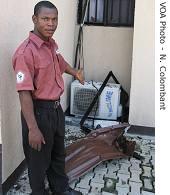-
(单词翻译:双击或拖选)
Port Harcourt
20 May 2007
The oil-rich Niger Delta1 in southern Nigeria has become one of the world's most dangerous places, both for civilians2 and foreigners. VOA's Nico Colombant went to the scene of a recent kidnapping and to the memorial service of a former gang leader, for this report from one of the main cities in the lawless region, Port Harcourt.

A Guard shows destruction inside Indian compound, 19 May 2007
A guard at an emptied out residential3 compound, previously4 occupied by Indian petrochemical workers, walks through debris5 left behind by dozens of heavily armed militants7 who came by with dynamite8 in the early hours Saturday.
He says two Indian workers were taken hostage. The other Indians left, but their belongings9 remain.
There is no military presence in or around the recently attacked compound. The guard, who recently moved here to get a security job, says he is afraid.
"Since I came to Port Harcourt, I have not seen such things like this. So this is my first time witnessing such a thing like this. I am from Cross Rivers State, so I just came to Port Harcourt to find something to do, so unfortunately I was involved in this," said the guard.
He says danger seems to follow oil. Militants, who say they are fighting to get a share of oil revenue and justice for the people of the Niger Delta, get up to $1 million for releasing a group of hostages.
The guard, who preferred to remain unnamed for fear of reprisal10, says he believes they carry out attacks just for money.
"They do not fight for justice. If it were for justice, they will not destroy these things. I think they are fighting for money," he added. "They make it. They demand some money and they give it to them before they release [the hostages]."
Officials at facilities where the Indians worked for the Indonesian company Indorama said more information would not be available before Monday.
Other witnesses said the militants shot and killed a Nigerian driver while they escaped, not wanting him to indicate where they were going, and seriously injured a woman, by shooting her in the head, as she walked home from a nearby church from a night vigil.
One resident, who also preferred to remain unnamed, said it is not just the foreigners who are afraid.
"Their mode of shooting was too rough. People there are very scared. Many are even afraid to live in the same zone just because of the threat. Nobody knows what will be the next line of action because of fear and they want to go away," said the resident.
At a church , people sang to honor the life of Casi Boate, who had recently left gangs and militant6 groups, trying to advocate non-violence.
He was killed by a rival gang member, in retaliation11 for a recent murder of another gang leader, while visiting his home in nearby Bayelsa state, also in the Niger Delta.
His grieving sister Rosemary says many young men, in school and out of school, are encouraged to join what are locally known as cults12, violent groups that deal in crime and call for justice in the impoverished13 and lawless oil-producing area.
"The ones on the streets are chasing the ones on the campus. Now the ones on the campus are chasing the ones outside," she said. "It is like a kind of circle revolving14 around itself. I think it is kind of dangerous, really."
Outgoing Nigerian President Olusegun Obasanjo tried to disarm15 the main groups behind violence in 2004, but those efforts failed.
Militants were paid money for handing in their weapons, sometimes more than two-hundred dollars each. Some say they were able to buy many more weapons with the money they received.
New powerful state governors and a new president, the ruling party's Mussa Yar'Adua, formerly16 a northern governor, are to be sworn into office on May 29.
International observers, Nigerian human-rights activists17, opposition18 leaders and militant leaders in the southern oil region have denounced the elections as falling far short of democratic expectations, following many instances of fraud, violence, and mismanagement surrounding the voting.
 收听单词发音
收听单词发音
1
delta

|
|
| n.(流的)角洲 | |
参考例句: |
|
|
|
2
civilians

|
|
| 平民,百姓( civilian的名词复数 ); 老百姓 | |
参考例句: |
|
|
|
3
residential

|
|
| adj.提供住宿的;居住的;住宅的 | |
参考例句: |
|
|
|
4
previously

|
|
| adv.以前,先前(地) | |
参考例句: |
|
|
|
5
debris

|
|
| n.瓦砾堆,废墟,碎片 | |
参考例句: |
|
|
|
6
militant

|
|
| adj.激进的,好斗的;n.激进分子,斗士 | |
参考例句: |
|
|
|
7
militants

|
|
| 激进分子,好斗分子( militant的名词复数 ) | |
参考例句: |
|
|
|
8
dynamite

|
|
| n./vt.(用)炸药(爆破) | |
参考例句: |
|
|
|
9
belongings

|
|
| n.私人物品,私人财物 | |
参考例句: |
|
|
|
10
reprisal

|
|
| n.报复,报仇,报复性劫掠 | |
参考例句: |
|
|
|
11
retaliation

|
|
| n.报复,反击 | |
参考例句: |
|
|
|
12
cults

|
|
| n.迷信( cult的名词复数 );狂热的崇拜;(有极端宗教信仰的)异教团体 | |
参考例句: |
|
|
|
13
impoverished

|
|
| adj.穷困的,无力的,用尽了的v.使(某人)贫穷( impoverish的过去式和过去分词 );使(某物)贫瘠或恶化 | |
参考例句: |
|
|
|
14
revolving

|
|
| adj.旋转的,轮转式的;循环的v.(使)旋转( revolve的现在分词 );细想 | |
参考例句: |
|
|
|
15
disarm

|
|
| v.解除武装,回复平常的编制,缓和 | |
参考例句: |
|
|
|
16
formerly

|
|
| adv.从前,以前 | |
参考例句: |
|
|
|
17
activists

|
|
| n.(政治活动的)积极分子,活动家( activist的名词复数 ) | |
参考例句: |
|
|
|
18
opposition

|
|
| n.反对,敌对 | |
参考例句: |
|
|
|















